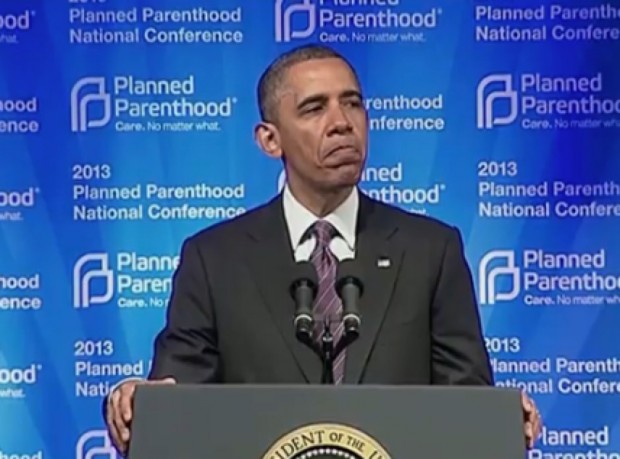 Yes, it’s shameful that the president of the United States has no compassion for America’s unborn. But speaking for myself, it’s hard to feel too much umbrage toward him personally. Barack Obama has established himself as one of the primary antagonists in this chapter of America’s story, so it’s to be expected that he’ll do the wrong thing. What really bothers me is the fact that our protagonists fail to meet his efforts with a proportional response.
Yes, it’s shameful that the president of the United States has no compassion for America’s unborn. But speaking for myself, it’s hard to feel too much umbrage toward him personally. Barack Obama has established himself as one of the primary antagonists in this chapter of America’s story, so it’s to be expected that he’ll do the wrong thing. What really bothers me is the fact that our protagonists fail to meet his efforts with a proportional response.
From elected leaders, strident abortion rhetoric is decidedly one-sided. Democrats shriek that anything less than unconditional support for abortion shows “contempt” for an entire sex, and usually most of the GOP would rather talk about something else. When they do, the best Republicans can come up with are general statements about a culture of life and respect for American consciences. Rarely do we see the ostensibly pro-life party give abortionism true moral indignation, like Mary Lazich of Wisconsin or Dick Black of Virginia have, and even that often amounts to just a flash in the pan.
Nor does the callousness it takes to defend abortion seem to inform Republicans’ broader assessments of Democrats’ character. For most of the presidential campaign, Mitt Romney qualified his every criticism with insistence that he thought Obama was a “nice guy” who was merely in over his head. Preemptively conceding that Obama’s “not a bad person” is a mainstay of Sen. Marco Rubio’s speeches. Speaker of the House John Boehner claims he “absolutely” trusts Obama, with whom he has a “very good relationship” that is “open” and “honest.” Sen. Scott Brown deems Obama a “good man” who possesses “just different priorities.” When Republicans do question Obama’s character, they either recant quickly or see other Republicans run away from them.
I’m sorry, but Barack Obama isn’t a good man.
Decent people may identify as pro-choice if they are genuinely misled about what the unborn are, what abortion does to them, and what the effects of prohibiting it may be. But they do not promote abortion through every stage of pregnancy, for any reason, without any regard for the baby’s welfare, all the while displaying complete indifference to the accuracy of what they’re basing those views on. They do not lie on behalf of the practice and its practitioners. They do not slander those who disagree. They do not turn a blind eye to the plight of the unborn after taking an oath that charges them with knowing better about the rights they are sworn to uphold.
Our politicians should be honest enough to say so.
As nice as disagreeing without getting disagreeable would be, it’s not how the world works. When one side is on the warpath and the other is trying to channel Mister Rogers, the result is not the latter’s innate goodness shining through and melting people’s hearts. It’s horrific ideas and malicious stereotypes taking root in the public consciousness because they’re constantly being reinforced without anything to counter them. Lots of bad ideas can take on an unearned air of legitimacy when people hear them from important people without pushback. “Nice guy,” etc. implies trustworthiness, lending validity (or at least the presumption of sincerity) to their accusations against us – after all, a “nice guy” wouldn’t say such ugly things against someone unless they were really warranted, would he? And “good man” fosters a cognitive disconnect between the abortion supporter and the moral severity we assign to abortion itself.
All this is not to say pro-life officeholders should become reckless, obnoxious purveyors of gratuitous bile for its own sake. (Talk radio fans, think of it as the difference between emulating the tone of Dennis Prager vs. that of Michael Savage.) All we need is for the people representing us to indicate that abortion disturbs them as much as it disturbs us, and to signal to the general public how much it should disturb them, too.







